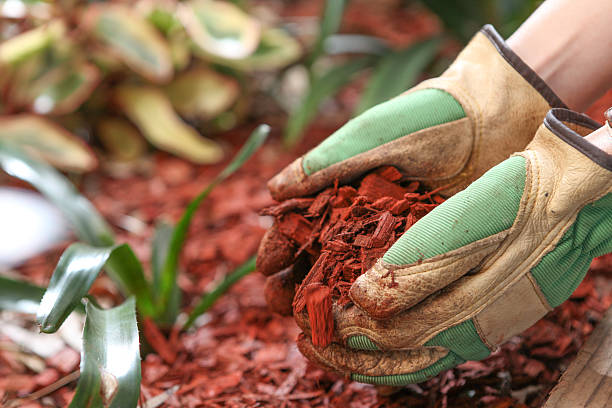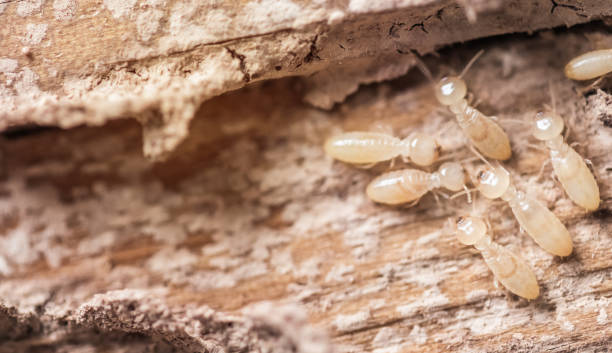4 types of Garden Mulch explained
It’s the start of Spring and you are likely out and about in the garden soaking up the warmer days. If you’re working on preparing your garden beds you may have considered adding mulch either for aesthetic reasons or to retain moisture during the upcoming drier hotter months.
Mulching has many benefits for your garden from keeping the soil cooler, to suppressing weeds plus mulching can provide an instant manicured look for very little effort. So, which type of mulch do you choose? We have highlighted the benefits of some of the most popular mulches to help you decide what best suits your garden environment.

Pine Bark Mulch
Pine bark mulches are made up of bits of pine bark shredded into similar size pieces. These woody mulches don’t mix well into the soil because they are chunky however they look fresher for longer and last longer than the finer organic mulches. Native Australian garden plants thrive on the natural acidity that this bark mulch provides. So, if you have bottle brushes or a variety of the common everlasting daisies this bark will serve you well.
If you live in Perth you will be very familiar with the Freemantle doctor winds. These strong winds that blow in from the west can run through your garden and light a freight train so having the chunkier mulch means it doesn’t blow away and the bark chip has excellent water retention capabilities to prevent wind evaporation.

Organic-Based Mulch
Organic mulches are produced through the natural process of turning and ageing the organic tree matter, adding different soils, water and peat to the mix. The results are a mulch that is high in nitrogen and potassium which helps to improve the soil’s structure, drainage, and nutrient-holding capacity. These organic mulches are ground into a course medium or fine consistency and unlike bark mulch decomposes over time making them a great composting material that is easily incorporated into the soil.
You may wonder why they vary in colour; this is usually for aesthetic appeal. Some mulches are left a natural colour others get a blackening agent added or a black organic waste material to achieve different looks and colour varieties for the decorative gardener.

Chip Mulch
Chip Mulch is a by-product of the milling industry and is essentially a tree that has been felled and put through a chipper. Sometimes the chips are treated with a natural dye for aesthetic appeal. Some gardeners prefer dark mulches because they provide an elegant contrast in colour, and some prefer the more natural rustic or woodland look, it depends on your personal preference and what suits your garden style.

Stone Mulch
If you need the functionality for broad acreage mulching then crushed gravels will work well as mulches in areas that require good drainage. Crushed gravel such as Blue Metal or a Rainbow Stone can be used and integrated well into beds with plants that like a little heat like a Mediterranean herb garden.
Something to consider is that stone is hard to move or remove and will require some physical manhandling to landscape the area.

Top 4 Best-Selling Mulches
With so many varieties on the market take your time to consider your garden’s soil conditions, landscape, weather and plant needs before selecting a mulch. Here is a list of mulches currently trending as top sellers.
- Sandgroper mulch adheres to all Australian safety standards and is approved for use in government schools and playgrounds. The natural treatment process includes mixing soil, peat and organic tree waste with fine particles of organic material to produce a premium quality mulch with superior water retention properties.
- Jarrah Wood Chip is most popular for its attractive red colour that fades to grey over time, Due to the chip size and weight, it’s a popular option for windswept areas.
- Karri Peat Mulch is a dark mulch blend of crushed jarrah, karri bark and peat that adds nutrients to your soil as it composts. This fine mulch can also help to reduce erosion.
- Pine Bark Chip is a perennial favourite for many gardeners. This chip is a natural decorative choice for low-maintenance gardens, it’s long-lasting and affordable.
In a natural setting, the ground surface is covered by leaves and branches and these decomposing materials create a layer that protects the plants and soil from seasonal changes. Spreading mulch in your garden mimics this natural process. Here are a few additional answers to some common mulching questions.

How Long Does Mulch Last? This depends on several factors including:
- How much sun exposure does the bark get? Depending on where your bark is located, say, in the full sun, partial sun or shade will determine how fast the bark fades.
- How much do you water? Organic mulch will compost quicker with frequent watering.
- Do you leave the mulch bed undisturbed or toil the soil routinely? The amount of foot traffic across the mulch determines the wear and longevity of the bark.
In general, you should get at least 12-18months before having to top up the mulch. We recommend that the mulch is laid at a depth of between 75mm- 100mm and if maintained annually will preserve and protect your plants without fail.

When Is The Best Time To Mulch?
While you can mulch any time of the year most gardeners will use spring as a reminder to prepare beds for the summer heat and drying winds. Autumn is also a great time to mulch because the mulch can help to regulate the soil temperature and protect from frost, especially for younger plants that are still establishing.

Does Mulch Attract White Ants?
This a great question and in general we would say, no. Western Australia, in particular, is not as susceptible to white ants as many other parts of Australia are. White ants are not naturally attracted to organic mulch products however most pest companies will advise that mulch is not laid within 100mm of your home and more specifically not piled up against your building walls. If your garden beds are against your walls it is recommended that a non-permeable layer is used to prevent moisture build-up which white ants are attracted to.

In Summary
Mulch is a garden staple for many beneficial reasons. Apart from making beds look stunning, mulch helps to keep the soil moist and can reduce watering by up to 60%. Just from a water-saving perspective, the benefits of adding mulch to your garden should be enough motivation to get stuck in and prepare for the summer months.
